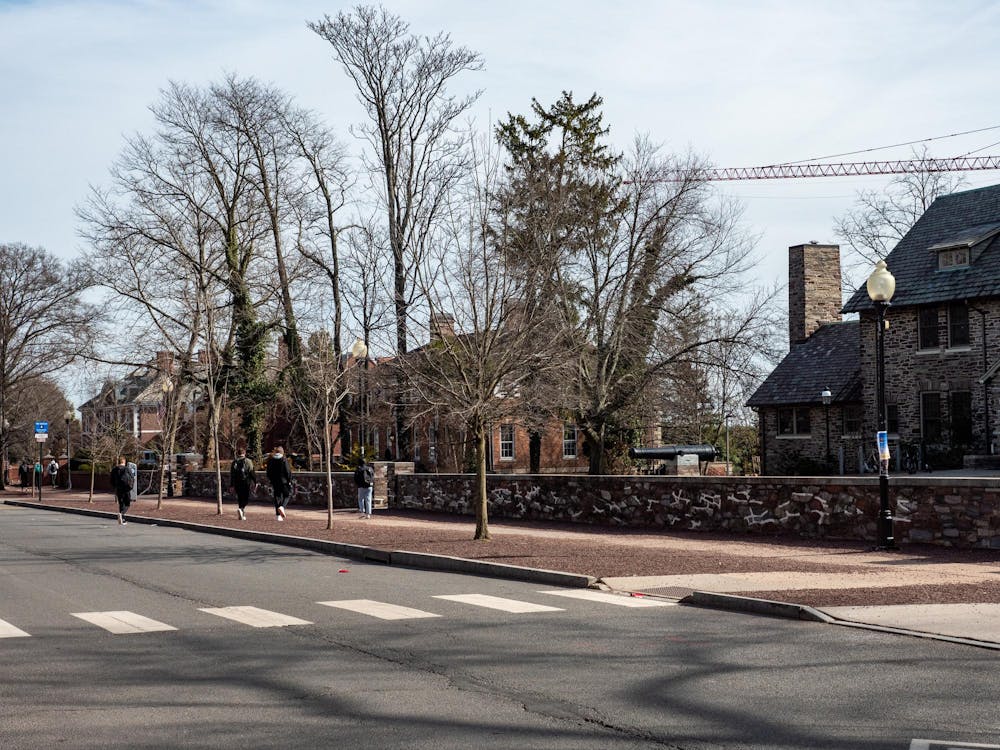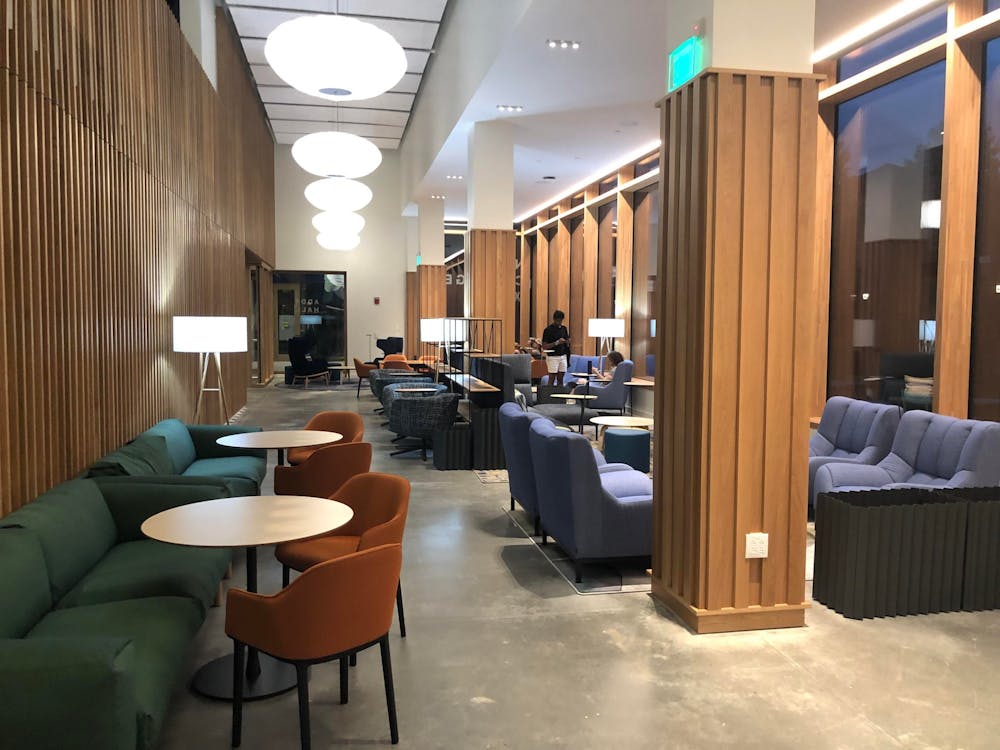Street Week 2024 concludes with 629 students being offered spots in Bicker clubs. With the Class of 2026, Princeton’s largest undergraduate class in history taking to the street, also came historic numbers. According to a press release sent to The Daily Princetonian from the Interclub Council (ICC), a total of 1,193 students — about 80 percent of the sophomore class — took part in Street Week. This is the largest number of sophomore participants that the ICC has seen in the past decade.
Street Week took place between Jan. 29 and Feb. 6, as hundreds of undergraduates flocked to the eating clubs on Prospect Avenue for multiple nights of one-on-ones, group conversations, and games. Though the Class of 2026 is the largest class the University has ever seen, interest changed unevenly across the street. This year, there was a large increase seen in bickerees at Tiger Inn (TI), a drop in interest at Cannon Dial Elm, and Charter’s selective sign-in process leaving many who ranked it first on the ICC portal out in the cold.
Based on data obtained by ‘Prince,’ a total of 1,207 Princeton students were placed into eating clubs during Street Week 2024, a figure which includes juniors and seniors placed in eating clubs that were not counted in the figure provided by the ICC.
The ‘Prince’ reached out to officer teams at every eating club, along with the ICC. With the exception of the officers of the ICC, none of the officer teams responded by publication time.
629 students were offered spots in Bicker clubs, with 578 were placed into sign-in clubs. There was little change from last year's figure among Bicker clubs, when 633 students were offered spots in Bicker clubs, while the number of those who were placed into sign-in clubs rose from 516 the year prior. Of the 629 students accepted to a Bicker club this year, 607 were sophomores.
66 percent of sophomores who participated in Street Week chose to double bicker, a figure that has risen in recent years. In 2017, when double bicker was instituted for all clubs, the ICC reported that 46 percent of sophomores chose to double bicker.
Students had until Thursday, Feb. 8 at 8 p.m. to rank their club preferences. When decisions were released on Friday, Feb. 9 at 10 a.m., the site crashed, though it was up and running again within the next 30 minutes.

The ICC's computer system failed to place a small number of students in an eating club due to this year's swell in interest. According to Beams, "The computer matching system ensured that 99% of participants were matched with a club. Given 2026's unprecedented class size, requiring bickerees to rank just two sign-in clubs most likely resulted in the discrepancy between 99 and 100%." Beams stated that the ICC will recommend that students rank two additional clubs next year to avoid this outcome.
Tower accepted the most new members among the Bicker clubs, while Terrace welcomed the most among the sign-in clubs. The same situation occurred last year, though Tower’s incoming class size rose while Terrace’s fell.

Tower's incoming class in particular rose greatly. Tower welcomed 165 new members, including 10 juniors and three seniors — its largest incoming class since at least 2001. Tower members shared with the ‘Prince’ that 278 people signed up on the ICC website to bicker Tower compared to 232 last year. While 278 signed up to bicker Tower, only about 240 bickerees were discussed — a situation that also occurred last year, when about 170 bickerees were discussed. Tower had an acceptance rate of 59.35 percent, about the same as the 2023 rate of 60.8 percent.
Higher demand from 2026’s large class and limited spots available resulted in decreasing acceptance rates in most clubs. Tiger Inn, in particular, had a drop in acceptance rate from 29.4 to 25.7 percent. This made TI the most selective Bicker club on the street, narrowly edging out Ivy. This is the first time TI has held this distinction since double bicker was established for all Bicker clubs in 2017.
TI's increase selectivity was due to a surge in interest, with the number of bickerees rising from 296 to 374. TI’s incoming class rose from 87 last year to 96 this year, 90 of whom were sophomores and six of whom were juniors. TI’s acceptance rate was slightly lower for juniors than sophomores at 26 percent, with the club accepting six of 26 juniors — about 23 percent.
For the first time since at least 2001, more students bickered TI than Cap and Gown. Cap and Gown saw 360 bickerees, roughly unchanged from 358 last year, and accepted 100, yielding an acceptance rate of 27.8 percent. All those who bickered Cap and were admitted were members of the Class of 2026, as the club does not allow juniors or seniors to spring Bicker.
Cannon Dial Elm Club had 171 bickerees and accepted 101 new members. Both figures were down from last year, when Cannon had 193 bickerees and admitted 123. This yields an acceptance rate of approximately 59 percent, lower than the 63.7 percent acceptance rate last year. 99 of Cannon’s 101 admits were sophomores.
Ivy Club accepted 78 of its 291 bickerees this year, all of whom are sophomores. This marks a decrease from 87 last year, when Ivy accepted its biggest class ever. Despite this drop, 2024 marks the second-largest incoming class Ivy has seen since 2001. This decreased class size may be an attempt at reinforcing an Ivy practice of accepting a small number of students to foster a closer community. In 2016, former Ivy Bicker Chair Michael Moorin ’16 told the ‘Prince’ that “we believe Ivy’s small membership is core to its identity.”
Cottage Club accepted 89 students, 88 of whom were sophomores. According to individuals with knowledge of the process, about 270 students bickered Cottage, an estimate in line with estimated figures provided to the 'Prince' last year.
The ‘Prince’ also obtained data on how many people were placed into each sign-in club.
Terrace welcomed 143 new members into the club, 140 of whom are sophomores — the largest incoming class of any sign-in club.
Colonial offered spots to 120 members, of whom 115 were sophomores. This represents a surge from 70 people admitted last year. Colonial's uptick in membership may be due to its early sign-in program, in which new sophomore members could gain admission to the club before Street Week even began.
Quadrangle offered spots to 102 members, similar to the 109 it welcomed last year.
Cloister offered spots to 103 members, 102 of whom are sophomores, the largest incoming class the club has seen since 2014. Cloister has faced the possibility of closure given recent low membership numbers and financial difficulties, though a recent fundraising drive raised over $100,000 according to the club’s Graduate Board of Governors.
Cloister’s leadership admitted that many students placed into the club did not rank it first, with President Alexandra Wong ’25 saying in an email to admitted members that “Whether or not Cloister was your first choice, we’re thrilled to have you in 65 Prospect and we can’t wait to get to know all of you.”
Though Cloister admitted a large number of students, its struggles with yield in the past mean that this new influx may not lead to a surge in membership. A ‘Prince’ analysis found that only 18 of the 86 students Cloister admitted in February 2023 were listed as members in November.
Charter welcomed 110 members to the club, in line with the 102 it accepted in 2023. Charter is the only eating club that utilizes a selective sign-in process that awards points to prospective members for demonstrating interest in the club, including attending events such as coffee chats pre-winter break and during Street Week.
Charter has increased in popularity since its adoption of selective sign-in in 2020. Based on the point values and eating club placements of several members who ranked Charter first, the ‘Prince’ corroborated that the cutoff for admission to Charter was approximately 13 points — an increase from last year’s cutoff. Using this estimate, anyone with less than 13 points, or who did not rank Charter first, was not offered membership into the club.
With Charter continuing to increase in popularity, but not increasing its incoming class, conversations are re-emerging whether Charter should become a Bicker club as it decided to do in 2021 — a plan that was eventually dropped. In interviews with the ‘Prince,’ two students who ranked Charter first but did not gain admission to the club said they do not believe Bicker is the solution to rectify Charter’s admission woes, but failed to conceive any alternatives to handling the club’s continued surge in popularity.
“I kind of just put the blame on me for not deciding early enough. I hope they [the eating clubs] take this as a learning experience. So maybe they’ll try to change the system somehow next year to make it less stressful for people,” Dashram Pai ’26, a sophomore who ranked Charter first and said he received 12 points, said in an interview with the ‘Prince.’
Pai is a staff Constructor for the Puzzles section of the ‘Prince.’
Olin Zimmet ’26, a sophomore who ranked Charter first and said he received 12 points, told the ‘Prince,’ “The unfortunate nature of my — and many others’ — circumstances is simply due to the sheer number of students who vied for a spot, not any wrongdoing on the part of Charter or its officers.”
To many members, alumni, and students, Charter has developed a unique identity as a club that rejects evaluative Bicker, making such changes difficult.
“Evidently, this outcome is unfortunate for folks like me who had 12 or 13 points and were not admitted, but I cannot think of another way for Charter to both remain selective and make the system more fair than it already is,” Zimmet added.
Charter was not the only club that left students disappointed at 10 a.m. on Friday.
“I’d say that I felt like I could pretty much waltz in, no problem,” Courtney Harrison ’26, an athlete on the softball team who bickered Cannon, said in an interview with the ‘Prince.’ Harrison was not among the 101 new members accepted into Cannon, despite the fact that all of the other sophomores on her team that bickered Cannon gained admission into the club. Cannon members are primarily athletes.
Harrison said that her rejection from the club left her in a state of “denial.”
She learned of the news from her teammates Thursday night so that she wouldn’t be “blindsided” on Friday morning. Harrison’s team assured her that she was not “red carded” during Cannon deliberations, in which a member of the club negatively flags a bickeree, eliminating them from discussion and the possibility of membership.
Despite these frustrations, most sophomores emerged from Street Week satisfied, with the ICC saying that 81 percent of students who participated in Street Week were placed into their first or second choice club.
In the wake of Street Week, some students have begun to explore alternate options for their dining plan next year, such as joining a co-op, going independent, enrolling in the University dining hall plan, or joining another sign-in club, with Pai saying he hopes to sign in to Colonial, while Zimmet plans to go independent.
The end of Princeton’s unique and historic tradition has brought reflection and melancholy to the students who participated.
“Social standing doesn’t speak to how you are as a person and your character,” Harrison added. “What’s important in being at this university and at any university is choosing people that really see you as you generally are.”
Even though there is still much to decide, some students, like Harrison, are just happy to go back to normal life.
“During that week I just felt like I wasn’t putting my best quality forward. So finally [when Street Week was over] I felt like I could exclusively start focusing on academics as well as softball.”
Justus Wilhoit is a senior News writer and assistant Audience editor for the ‘Prince.’
Mary Ma contributed data visualization for this piece.
Note: This piece has been updated since publication to include an additional figure on the number of bickerees.
Please send any corrections to corrections[at]dailyprincetonian.com.








